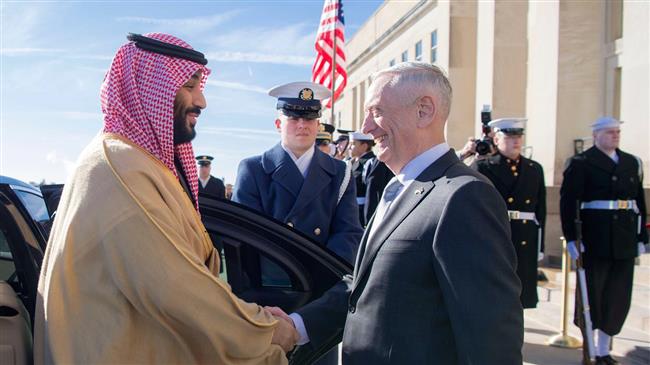
RNA - For the massive political protection and military goods that they have received throughout the many years since then, the Saudis haven’t been exactly grateful. Along the way, they have quietly betrayed America — their biggest benefactor — by secretly backing violent fanatics whose acts of terror have not spared American citizens. But the Saudis have been able to get away with it because, as they may have rightly calculated, the US needs them too, even if in a very different way than how they need the US.
Western political ethics can’t provide reason to blame the Saudis. After all, the West has been following in the footsteps of the Americans’ British cousins:
“We have no eternal allies, and we have no perpetual enemies. Our interests are eternal and perpetual; and those interests it is our duty to follow,” Henry John Temple Palmerston, British prime minister from 1859 to the mid-1860s, once infamously remarked.
Saudi Arabia’s interests, it turned out, were in remaining nice to America in appearance and holding its attention while funding terrorism that has, among many other world countries, also affected the US.
That is not principled politics. That is naked opportunism.
So, when the Saudi crown prince, Mohammed bin Salman, started an extended tour of the US on March 19, he was about to surprise no one.
Today, as in the past two years when Mohammed and his father have been in power, Saudi Arabia likes to have an enemy in Iran, and it likes to talk about it — a lot.
“We know the target of Iran,” Mohammed bin Salman told The New York Times on March 27. “If they (the Iranians) have a nuclear weapon, it’s a shield for them to let them do whatever they want in the Middle East, to make sure that no one attacks them or they will use their nuclear weapons.”
Then, in an interview with The Atlantic’s Jeffrey Goldberg, he referred to Iran as many as 14 times, according to a “condensed” transcript.
Still later, in an interview with TIME, when he was asked how much Saudi Arabia’s interests aligned with those of Israel, Mohammed bin Salman replied, “Well, it seems that we have a common enemy,” most likely having Iran in mind.
This obsession is pitiful. It is also a pity that the Saudis have misplaced the threat to their national security by expressing bizarre and unfounded concerns about Iran. But there are many pitiful things about Saudi politics if you are to take Mohammed bin Salman’s words — not least the clumsy way in which he has attempted to portray the Saudi-led war on Yemen, his agenda for the Saudi economy, and his crackdown on domestic dissent.
In what seems to be a media blitz carefully choreographed by lavishly-paid PR firms in the US, he has parried the more difficult questions, though.
At one point in The Atlantic interview, he attempted to look on the verge of anger, ostensibly setting the ground rules for editor-in-chief Jeffrey Goldberg: “We don’t want to come here, as Saudi Arabia, and be asked these questions. We want to be asked about the economy, our partnerships, investment in America and Saudi Arabia.”
He was lying. He wanted to talk about Iran.
America and the ‘free-riders’
Mohammed bin Salman may be getting a lot of media attention and securing purchases of US military hardware during his charm offensive in America; but he is not really getting a decent treatment.
Former US President Barack Obama once famously calledSaudi Arabia and like-minded regimes “free riders” that “aggravate me.” In essence, Trump holds a similar view.
“Saudi Arabia is a very wealthy nation, and they’re going to give the United States some of that wealth, hopefully, in the form of jobs, in the form of the purchase of the finest military equipment anywhere in the world,” Trump told the visiting bin Salman on March 20, 2018, almost a full year after he similarly made his interest in Saudi money clear on a trip to Riyadh.
If they don’t pay, the Saudis are “free riders.” If they do pay, they will enjoy American services as will any other client state. That is not how a country treats a special partner or a strategic ally.
That Saudi Arabia goes out of its way to look special to America boils down to one sad fact: except for money, Riyadh has nothing to sustain its regional attempts for dominion and to fight an imaginary enemy in Iran.
And it is pitiable that Saudi Arabia should have to be treated poorly by the US despite the money and the niceties that it showers America with.
It is understandable that Saudi Arabia has had to buy a lot of things that it needs, including what it thinks is security. But that is not “reform” — as the US media attempt to portray Mohammed bin Salman’s appeal for foreign investment in Saudi Arabia. It is a huge auctioning off of the country’s assets, its security included.
If it is to develop its security, polity, or economy, Saudi Arabia should learn to train itself, not engage in the name-calling of its neighbors or use big checks to persuade the US and the United Kingdom to “reform” its economy.
Until it learns to do that, brandishing the manufactured Iran threat — while it may keep Saudi Arabia’s relevance for America intact — will only exacerbate the “war scenario in the Middle East” that Mohammed bin Salman talks about, not prevent one from actually playing out.
By Hossein Jelveh, Press TV
847/940